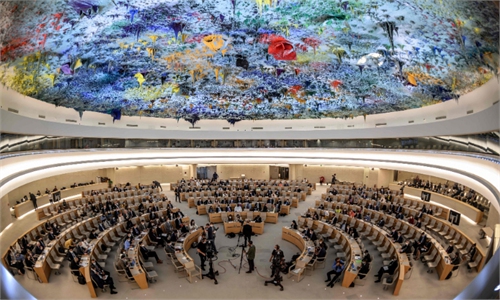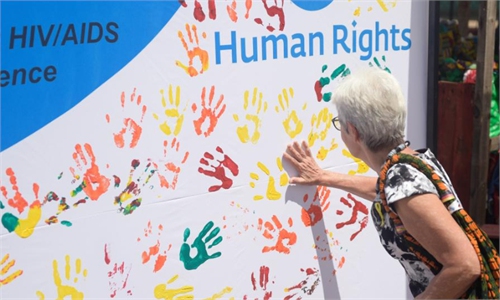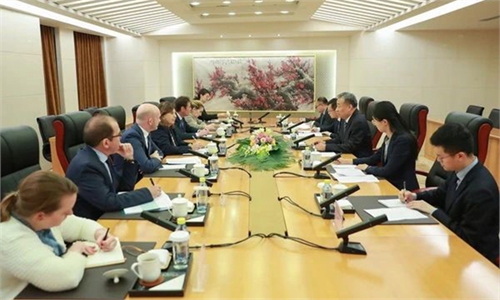
Miao Deyu, assistant minister of foreign affairs, meets with Paola Pampaloni, deputy managing director for Asia and the Pacific in the European External Action Service and EU delegation on June 17 in Beijing. Photo: Chinese Foreign Ministry
China and the EU recently engaged in deep and candid exchanges on human rights. During these discussions, China emphasized its opposition to the politicization and double standards of human rights issues and to using such issues to interfere in China's internal affairs. Despite their differences on human rights topics, both sides remain committed to dialogue, which analysts believe will help dispel negative disinformation and promote the healthy development of China-Europe relations.
On Monday, Miao Deyu, assistant minister of foreign affairs, met with Paola Pampaloni, deputy managing director for Asia and the Pacific in the European External Action Service, who was in China for the 39th session of the China-EU Human Rights Dialogue, according to a release from the Chinese Foreign Ministry on Tuesday.
During the meeting, Miao said that China opposes the politicization and double standards related to human rights issues, rejects countries imposing own development model on others, opposes using human rights issues to interfere in China's internal affairs, and opposes confrontation and microphone diplomacy on multilateral platforms.
At the press conference on Tuesday, Chinese Foreign Ministry spokesperson Lin Jian also reiterated that China firmly opposes politicizing human rights issues and double standards, and opposes interfering in China's internal affairs under the pretext of human rights issues.
China stands ready to conduct exchange and cooperation on human rights with the EU on the basis of equality and mutual respect to enhance mutual understanding and trust, broaden consensus, resolve differences and make progress together. "We hope the EU will work with us in the same direction, uphold dialogue and cooperation instead of confrontation and pressuring, and jointly contribute to the international human rights cause," said Lin.
The session was held in Southwest China's Chongqing Municipality on Sunday and it was co-chaired by the Director-General of the Department of International Organizations and Conferences of the Foreign Ministry Shen Bo and Pampaloni.
According to a release the EU External Action published on its website on Monday, during the dialogue, the EU stressed its "concerns" over the situation in China's Xinjiang, Xizang and Hong Kong, and on topics related to the death penalty and labor rights.
In response to the EU's unfounded accusations regarding judicial procedures, the death penalty, labor rights, ethnic and religious issues, China firmly refuted and clarified the facts, according to the release from the Chinese Foreign Ministry on Tuesday.
During the dialogue, the Chinese side emphasized that issues related to China's Xinjiang, Xizang, Hong Kong regions, and judicial cases are purely a matter of China's own internal affairs and should not be subject to external interference.
China demanded that the EU to stop interfering in China's internal affairs under the pretext of human rights issues, according to the release.
There are certain differences between China and Europe in the field of human rights, which is normal given their different understandings of the concept, Cui Hongjian, a professor from the Academy of Regional and Global Governance with Beijing Foreign Studies University, told the Global Times.
Cui noted that China emphasizes the right to development, while Europe focuses more on political rights. Additionally, China stresses the diversity of human rights practices and rejects Europe's imposition of its standards on others, arguing that human rights progress is a continuous process that can always improve. China consistently emphasizes that both sides should engage in dialogue with the goal of jointly promoting global human rights progress, while the EU often uses human rights as a policy tool to exert pressure on China.
However, despite all these differences, China remains committed to dialogue and exchanges with Europe, while the presence of these differences also underscores the need for continuous dialogue and exchanges, Cui added.
"While some in the EU attempt to limit the development of China-Europe relations by reducing dialogue and exchanges, we should not abandon dialogue simply because there are disagreements on certain issues. We should maintain an open attitude, seek consensus through continuous dialogue and exchanges, and promote the healthy development of China-Europe relations," Cui said.
While the release from the Chinese Foreign Ministry said that both sides agreed that the dialogue was candid and in-depth, contributing to mutual understanding, the release from the EU also noted that the agenda of the dialogue "allowed for in-depth discussions" on a wide range of human and labor rights developments both in the EU and in China.
The dialogue on human rights between China and the EU took place ahead of the 56th session of the Human Rights Council, scheduled in Geneva from June 18 to July 12. Analysts believe that these recent exchanges will help dispel disinformation about China's human rights.
Aside from engaging in official dialogue, the EU delegation also visited China's Xizang region from June 13 to 17, visiting projects related to local economic and social development, ethnic and religious affairs, education and culture, and human rights and legal protections.
The visit to the Xizang region is also part of the dialogue, providing EU officials with an opportunity to observe the human rights development in the area firsthand. Such arrangements demonstrate China's openness and sincere attitude, Zhang Yonghe, executive dean of the Human Rights Institute of Southwest University of Political Science and Law, told the Global Times.
To break through information barriers and counter disinformation regarding China's human rights, more exchanges between China and the EU are necessary, Zhang emphasized.




